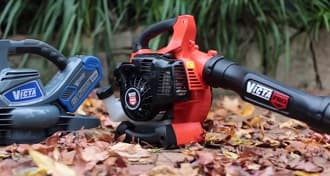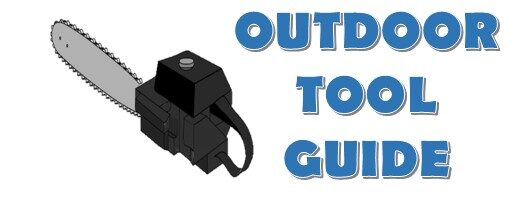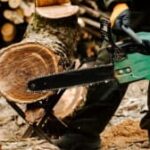As an Amazon Associate, this site earns commissions from qualifying purchases. For more information click here.
A leaf blower is a useful tool for clearing leaves and other debris in your yard or garden. It is faster than a rake and can pick up a lot of thrash easily. If you can use a leaf blower to clean stuff outdoors, can you do it too inside the house? Are there any risks involved? All these questions will be answered in this guide.
Leaf blowers should never be used indoors because it will scatter dust and debris, which can trigger allergies. Gas leaf blowers are potential fire hazards and the noise can damage your hearing.
Health Risks
A leaf blower can pose health risks when used indoors. Its nozzle is so powerful it will suck in not just air but dust, dirt and other airborne particles. A lot of these will get scattered in your house and could trigger allergies. Inhaling exhaust fumes can lead to a serious or fatal condition.
Outdoors is ideal for leaf blowers. If you follow the safety guidelines, you are wearing protective gear and no one is within 50 feet of the area.
Indoors it is a different story. If you use a typical blower with 500 CFM like the Skil PWR Core, it will scatter dust, dirt, pet hair, etc. These can trigger asthma attacks, eye irritation, skin inflammation and other allergies. A more powerful blower will cause even more of these to fly.
Dirt, dust and other particles can strike anyone but elder folk, infants and those with weak immune systems are the most vulnerable. If you or someone in your household has a respiratory condition, the particles a leaf blower scatters can make the condition worse.
Gas leaf blowers also produce smoke that contain chemicals which induce headaches, dizziness and nausea. When these contaminants enter your body it makes you vulnerable to lung cancer, heart disease and other ailments.
If you use a leaf blower inside, it will contaminate the air. Instead of clearing and cleaning, it will make things worse.
Physical Injuries
Leaf blowers can cause lacerations, hearing loss, electrocution, contusions and other injuries. These can happen anytime but the odds increase when it is used indoors. Space is limited and if there are other people with you, they could get hurt by accident.
Electrocution. At first it seems like electric leaf blowers are safe to use inside. While it is not a big fire risk like gas, there is the possibility of electrocution. If the motor overheats it could short circuit the motor and cause an electric shock.
Frayed or loose wiring are electrical hazards. Accidentally dropping the tool on a wet surface, touching with wet hands, faulty wiring, a damaged power outlet, etc. any of these can cause electrocution.
Other physical injuries can occur if you are handling a large blower. You could also trip over a corded blower or the cord might come off if you walk too far from the power outlet.
The dangers with gas blowers are more numerous. Aside from those that have already been mentioned, you could mishandle the oil and gas while mixing and it makes contact with your skin.
Noise Pollution
Leaf blowers are noisy, particularly gas. Some electric leaf blowers are quieter but most of them are just loud. Even those labeled as quiet will cause hearing discomfort when used in an enclosed area.
Anything under 70 decibels is tolerable but above 80 and it starts to cause discomfort. If your ears are continuously exposed to loud noises the risk of deafness is real. This is why most states – and blower manufacturers – state humans and pets must be at least 50 feet away.
Anyone who uses a blower is required to wear ear protection and you can see why. Now imagine a 90 decibel gas blower inside your house. An enclosed environment makes the sound even louder.
The average gas leaf blower has a range of 80-90 decibels. Electric blowers like the Black + Decker LB700 are in the 65-70 range with newer models around 59 decibels..
Gas leaf blowers are the noisiest and can cause hearing loss. Even if you don’t plan to use a leaf blower indoors, you sold check the noise level before you buy. You may wear ear protection when using your blower, but people around you do not. So out of courtesy, look for a blower with the lowest decibel possible that still matches your needs.
Fire Hazard
Gas powered devices are always a fire hazard. Like other power tools , most leaf blowers rely on fuel for power. Smaller ones use electrical power or run on batteries, but most are gas dependent. Using a gas powered tool in your home creates a fire and health risk.
The most obvious risk here is fire. There are a lot of flammable materials inside a house and gasoline can quickly start a fire. If you have a leaf blower or anything running on fuel indoors, keep it away from aerosols, alcohol, cooking oil and disinfectant sprays. Acetic acid, acetone and other solvents are highly flammable too.
Leaf blowers produce smog and smoke which are health risks. An overheated engine or the wrong fuel mix can cause gas to leak and fumes. If the fuel leaks, people in the household are at risk of inhaling gas. Gas vapors can induce fainting, nausea and irritate the throat, eyes and nose. Serious injury can occur if gas gets in your eyes, so safety glasses are a must.

Why Leaf Blowers Must Not be Used Indoors
Aside from what has been already explained, there are other reasons why it is not a good idea to use leaf blowers of any kind indoors.
- People in your house not familiar with how a leaf blower works might get into an accident. Children and pets are most at risk.
- Leaf blowers are effective in removing leaves, dust and other debris in wide open spaces. If you attempt this indoors, the blower will pick up all kinds of particles and pollute the air.
- The blower could pick up all kinds of objects – coins, toys, wiring, and assorted small objects – and these can get stuck inside the machine. It can damage the nozzle and cost a lot of time and money to repair.
- Using a leaf blower inside a house with other people or pets in it goes against the recommended safety distance of 50 feet. People and animals within 50 feet are at risk of inhaling dust, dirt and the pollutants the leaf blower produces.
- A fuel leak can cause a fire in your house if it makes contact with a flammable object. Even if it does not, the smell of gas can make people ill. If you are using an electric blower, the danger is with electrocution. If there is any damage to the tool, it could lead to physical injury.
- Mixing fuel in an enclosed space with poor ventilation is dangerous anywhere, especially indoors. Because homes have a lot of flammable material, it is easy to start an accidental fire.
- You could trip over toys, the carpet and other things inside. You could hurt yourself or accidentally drop the tool.
How to Use a Leaf Blower Safely
- Only use a leaf blower outdoors. While some may say an electric blower is safe, the risk is still there. Even assuming the cord is fastened tight, the force being produced by the blower will spread dust, fur, and dirt all over the place.
- And as pointed out earlier, the noise produced by leaf blowers is irritating and a potential health risk. There are other ways to clean your home without using a blower.
- Never use a leaf blower is you are unwell or tired. If any part gets broken and needs replacement, use only those that the manufacturer recommends. This is necessary to avoid incompatibilities that can affect performance.
- Lastly, follow the instructions provided in the owner’s manual. You will get a lot of essential information on how to properly use the blower safely.

I love the outdoors and all the tools for maintaining gardens, yards and lawns. The only thing I am more passionate about is sharing what I know about garden and outdoor equipment.


